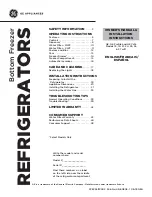
longer time, or by the dirt accumulated gradu ally inside the filter . Sometimes, tapping the filter na y
cause a passage for flowing, Touching it with your hand, you will feel that it is cooler compared with its
temperature in the normal state.
REMEDY
The same as described in the capillary clogging with dirt.
3) Troubles of Compressor
a) Breakage of gas suction and discharge valve blocks
ANALYSIS OF TROUBLE
The compressor works by means of the opening and closing of gas suction valve and discharge valve
to suck and discharge the refrige
rant. If the valv e block is broken, the refriger
ant can not b e
discharged, and hence no refrigerating can be achieved.
METHOD FOR MAKING JUDGEMENT
It is quite difficult to differentiate this trouble from others because they often have similar symptoms. In
repairing, fir stly, hear attentively if there
is some abno rmal sound coming from the compressor
(sometimes , the broken pieces of valve block may strike against the cylinder), and feel th e
compressor casing with your hand to ascert ain whethe r it is too hot, this is also help
ful to the
troubleshooting; secondly , meas ure the pressures at the
high and lo w pressure port s of th e
compressor with pressure gauges, if the gas suction valve block is broken, the suction pressure gauge
pointer will swing violently and the suction pressu re is very high, wher eas when the gas discharge
valve block is broken , the discharge pressure ga uge pointer will swing drastically and the discharge
pressure is very hi gh. In the bot h cases, stop the compressor at once, and if technique is available,
open the cylinder cover and check up the valve block, repair it, or replace it with a new one.
C. Sudden stop of Compressor during Its Running
The cause of sudden stop of a compressor during its running is mostly that the gas suction pressur e
and/or discharge pr essure excee d their re
spective pr escribed ra nges, thus making
a
pressure-operated protective relay shut off the power to the compressor and stop it. In the following we
discuss mainly the r easons for causing excessive ly hig h gas discharge p ressure and low suction
pressure.
1) Stoppage due to excessively high gas discharge pressure
A) Too much refrigerant charged into the system
ANALYSIS OF TROUBLE
The pheno menon, such as loose frosting and poor re frigerating ef fect, may occur if excessive
refrigerant has been charged into the system. Su perfluous refrigerant will occupy a cert ain space of
the evapor ator, thus red uce it s heat dissip ating ar ea, an d the phen omenon of “liquid s triking” ma y
occur, too. Meanwhile, dew or frost condensati on may occur on the gas return tube, and the ga s
discharge pressure will obviously ri se, when it reaches the thr eshold value, the protective relay will
actuate and shut off the power supply to the compressor.
REMEDY
Open the tubing, re-evacuate and then charge the system with a proper quantity of refrigerant.
b) Air left in the system
ANALYSIS OF TROUBLE
The residual air in the system will circulate together with the refr igerant in the system. The major
symptoms caused by this residual
air is hi gher gas discha rge pressur e, higher discharged ga s
temperature (the gas discharge tubing is considerably hot when you feel it with your hand), and poorer








































